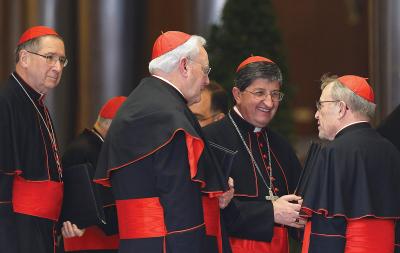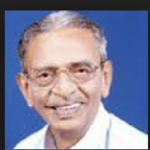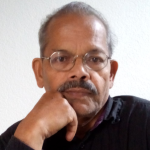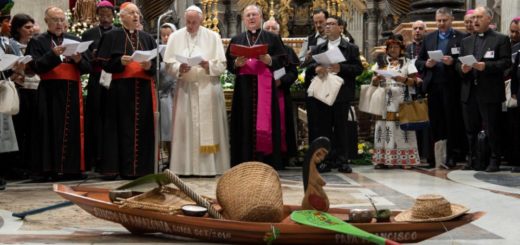Pope calls for ‘synodal’ church that listens, learns, shares

Cindy Wooden Catholic News Service, in NCR, Oct. 17/15
 (Note: This piece of Pope Francis’ speech, which explains how to live “Synodality” is the very core of Christian living for all from Pope at the top to the pauper Lazarus at the bottom. It is the panacea for all conflicts in the church community, where hierarchy has no place, because “the pope does not stand alone above the church,” but he is “within it as a baptized person among the baptized and in the episcopal college as a bishop among bishops, called at the same time — as the successor of the Apostle Peter — to guide the church of Rome, which presides in love over all the churches.” Hierarchy is not a structure meant to place some individuals above others to command and lord over forgetting their divinely assigned compelling duty, not just to act as equals with others, but to go down below others on their knees to do their singular duty of doing the foot-washing ministry to the rest of the community as Jesus showed by example at the last supper. Driven by this conviction already some 30 years ago, this scribe used to write: “By kneeling down at the feet of a rebelling and protesting Peter, “I don’t understand, you wash my feet” Jesus turned upside down a pyramidal church to stand on its sharp piercing top, buried on the dusty ground at the bottom. Even now many perching on various hierarchical rungs are protesting like old Peter saying; “I don’t understand!” Will they understand at least now and come down from their thrones, at least after seeing the example of Pappa Francis? Catholic church has relevance in this world only when it does this foot-washing service to a bleeding humanity in today’s world reduced to a war-torn battlefield, by the arrogant might of brute forces fighting each other. The text below is marked Red. Bold, Italics, underlined etc to convey their relative importance to help the reader give due time to reflect and absorb the full message they want to convey. james kottoor, editor)
(Note: This piece of Pope Francis’ speech, which explains how to live “Synodality” is the very core of Christian living for all from Pope at the top to the pauper Lazarus at the bottom. It is the panacea for all conflicts in the church community, where hierarchy has no place, because “the pope does not stand alone above the church,” but he is “within it as a baptized person among the baptized and in the episcopal college as a bishop among bishops, called at the same time — as the successor of the Apostle Peter — to guide the church of Rome, which presides in love over all the churches.” Hierarchy is not a structure meant to place some individuals above others to command and lord over forgetting their divinely assigned compelling duty, not just to act as equals with others, but to go down below others on their knees to do their singular duty of doing the foot-washing ministry to the rest of the community as Jesus showed by example at the last supper. Driven by this conviction already some 30 years ago, this scribe used to write: “By kneeling down at the feet of a rebelling and protesting Peter, “I don’t understand, you wash my feet” Jesus turned upside down a pyramidal church to stand on its sharp piercing top, buried on the dusty ground at the bottom. Even now many perching on various hierarchical rungs are protesting like old Peter saying; “I don’t understand!” Will they understand at least now and come down from their thrones, at least after seeing the example of Pappa Francis? Catholic church has relevance in this world only when it does this foot-washing service to a bleeding humanity in today’s world reduced to a war-torn battlefield, by the arrogant might of brute forces fighting each other. The text below is marked Red. Bold, Italics, underlined etc to convey their relative importance to help the reader give due time to reflect and absorb the full message they want to convey. james kottoor, editor)
Vatican City: Marking the 50th anniversary of the Synod of Bishops, Pope Francis outlined his vision for a church that is “synodal” at every level, with everyone listening to each other, learning from each other and taking responsibility for proclaiming the Gospel.
“The journey of synodality is the journey that God wants from his church in the third millennium,” the pope said Oct. 17. “A synodal church is a listening church, aware that listening is more than hearing. It is a reciprocal listening in which each one has something to learn.”
Francis, members of the Synod of Bishops on the family, theologians and other guests dedicated a morning to marking the anniversary of Blessed Paul VI’s institution in 1965 of the synod as a forum for sharing the faith and concerns of the world’s Catholics, reflecting together and offering counsel to the pope.
Synod = Walking together
Referring to the Greek roots of the word “synod,” Francis said, “walking together — laity, pastors, the bishop of Rome — is an easy concept to express in words, but is not so easy to put into practice.”In fact, before Francis spoke, five cardinals, an archbishop and the patriarch of the Chaldean Catholic Church spoke about the blessings and challenges of the synod process over the past 50 years. They agreed that while the synod’s methodology has improved over the past five decades, there still is work to do.
“We must continue on this path,” Francis told them. “The world in which we live and which we are called to love and serve, even with its contradictions, requires from the church the strengthening of synergies in all areas of its mission.” Using the synod on the family as an example, the pope said it would have been impossible for the 270 bishops and priests who are voting members of the assembly to speak to real needs and concerns without listening to and trying to learn from Catholic families.
“It was that conviction that led me when I asked that the people of God be consulted” before the synod, the pope said. “How would it have been possible to speak of the family without calling upon families, listening to their joys and their hopes, their pains and their suffering?”
The need for everyone in the church — from the pope on down — to listen and to learn from others is based on the conviction, clearly explained by the Second Vatican Council, that through baptism and confirmation all members of the church have been anointed by the Holy Spirit and that the entire Christian community is infallible when its members discern together and speak with one voice on matters of faith and morals, Francis said.
“The ‘sensus fidei’ (sense of faith) makes it impossible to rigidly separate the ‘ecclesia docens’ (teaching church) and the ‘ecclesia discens’ (learning church) because even the flock has a ‘nose’ for discerning the new paths that the Lord is opening up to the church,” the pope said.
But ensuring the synodality of the whole church will be impossible, he said, if people misunderstand the church’s hierarchy and see it as a structure in which some people are placed above others.
Church, an Upside down Pyramid
The church’s structure, the pope said, “is like an upside down pyramid” with the top on the bottom, which is why the ordained are called “ministers” — they serve the others.In a diocese, he said, the bishop is the “vicar of that Jesus who, at the Last Supper, knelt to wash the feet of the apostles,” and the pope is called to truly be “the servant of the servants of God.” “We must never forget: for the disciples of Jesus — yesterday, today and forever — the only authority is the authority of service; the only power is the power of the cross,” he said.
The world needs the Catholic Church to witness to that Christian vision of community, participation, solidarity and joint responsibility, he said. In too many countries power is in the hands of just a few people, the dignity of many is denied and authority is abused.Francis told the gathering that “the pope does not stand alone above the church,” but he is “within it as a baptized person among the baptized and in the episcopal college as a bishop among bishops, called at the same time — as the successor of the Apostle Peter — to guide the church of Rome, which presides in love over all the churches.”
Work out Synodal Spirit
A synodal spirit must be at work in dioceses as well as in the universal church, Francis said. Priests’ councils, pastoral councils and other consultative bodies in a diocese must “remain connected to the base,” to the grassroots, if they are to help a bishop respond to the real needs and concerns of the Catholic people.
Looking specifically at the Synod of Bishops, the pope said the process for each synod must begin with listening to the faithful. The second stage is to have the pastors listen to each other. The role of bishops at a synod is to “act as authentic custodians, interpreters and witnesses of the faith of the whole church, attentively distinguishing it from the often changing fluxes of public opinion.”
The third stage of a synod is to listen to the pope, the bishop of Rome, called to make pronouncements “not based on his personal convictions, but as the supreme witness of the faith of the entire church,” he said.The fact that the synod is not a decision-making body and acts only “with and under” the pope, he said, “is not a limitation on its freedom, but a guarantee of unity.”
Kurian Joseph (Right Issue Delhi) wrote: The missing "third theme" of Holy Thursday.

Rightly said Kurien,
Priesthood and Eucharist are nothing, they used to be for me long ago, but not any more. What counts is the mental attitude to see your neighbor, even if he is the Lazarus with wounds liked by dogs, as your master deserving your service.
I always compared three people, Fr.Damian of Moloko, Mother Teresa, and Francis, with me. All three would readily embrace a bleeding leper, and I with all my convictions am repelled by them. Until I achieve the attraction to do it lovingly, I don't have the humility you speak of and until all Christians have that humility they can never become a force to radically change this world for the better.
I knew you would react, because many others who read it do not have the conviction and insight you have. The question is to have that conviction first, then the grace of God to act on that conviction, which I see Francis has it — eg. he — a 78 year old man — went visiting old people's home at 7 pm, told communist leaning squatters to stay happily the places they occupied in Rome and Francis is not doing it to show any one. Show me one another person like him. None of us have the right to preach. God bless you Kurien. james
A church that listens, learns and shares – This title first of all conveys the impression that by church here is meant those who occupy the positions of authority. That is itself a very wrong concept of the Church. Even taken in that sense, this is a wishful thinking that is not going to be realized until the official church abandons the claim that the priesthodd now functioning in the church involves some sort of annointing by the Hopy Spirit of God. This is against the Gospel message and is nothing but a myth. It is this fundamental missconcept about priesthood that thousands of priests and bishops cherish as dear as their life, and that makes them think and behave differently and make them in some sense superior and therefore unreachable to the majority of the body of the church, namely the laity. Unless and until this mythical costume is shed by the clergy, there's not going to be a church that is envisaged as a community of mutually loving members who are willing to listen, learn and share.
The Pope of course has understood it rightly and expressed it many times: Fo ex. he said once: “It was that conviction that led me when I asked that the people of God be consulted” before the synod, the pope said. “How would it have been possible to speak of the family without calling upon families, listening to their joys and their hopes, their pains and their suffering?”
But do the rest of the Synod members (like the Indian relates) understand themselves as teh Pope does? Definitely not. That also explains why the present synod is going to be a fiasco. The college of cardinals and bishops believe themselves to be in a position to dictate norms to Christian families that function in quite different ways than they imagin.

















